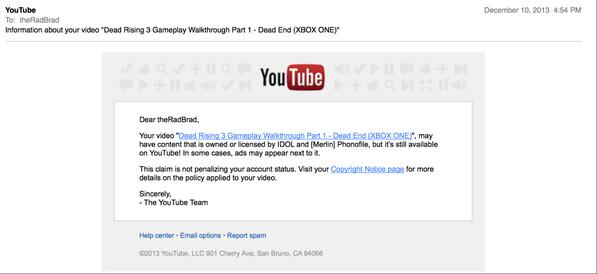If you enjoy watching video-game content on YouTube, today is not your day.
PC World reports that the site recently activated its Content ID copyright infringement detection system on affiliates of YouTube’s Multi-Channel Networks (MCNs), and the results are far-reaching. Since YouTube updated its terms in an effort to deter copyright infringement, video games channels have received thousands of copyright claims, particularly concerning video games content.
Video games are (as the name implies) a visual form, so it’s no surprise that video content has grown exponentially in recent years. Both the new Xbox One and PlayStation 4 consoles have integrated support for video output, and the Most-Viewed and Most-Subscribed channel on YouTube belongs to one Felix Kjellberg, a.k.a. PewDiePie, who plays through and discusses video games on his channel.
YouTube has been an important outlet for game videos because of its affiliate program, which allows content creators to earn money based on their channel views. For the most popular YouTube stars, this can amount to a significant amount of cash—potentially up into the tens of thousands of dollars.
Until this week.
Copyright claims
YouTube’s decision to implement Content ID included affiliates of MCNs (such as Machinima (one of the largest MCNs devoted to games). Game videos are always in a Fair Use gray area—many provide an unedited look at entire hours of a game, with only voiceover commentary added by the video creator. These efforts are easy targets for copyright claims, and publishers have laid down rules about what can be streamed in the past—rules they’ve rarely enforced.
Polygon reports that some channel operators have already lost up to 15% of their libraries to claims. Copyright claims are particularly damaging because they divert revenue from video views to whoever initiated the claim. You’d guess that the likely culprits in this case would be game publishers. Except the game publishers say no.
 |
| One recipient’s reaction to YouTube’s action |
Capcom, Deep Silver, Ubisoft, and more have gone on record to state that they’ve filed zero copyright claims this week, and Capcom even said it’s fighting over this with YouTube.
Publishers tend to like it when fans make online video content because it’s free marketing—their games get exposure to enormous audiences, with little effort on the publisher’s part.
These claims appear to have originated from far weirder sources, which, in some cases, includes companies that don’t really exist anymore.
Popular games personality TotalBiscuit tweeted, “Apparently THQ is putting out a lot of copyright claims, which is impressive since it no longer exists.” THQ went out of business earlier this year.
Other channels received copyright claims from third-party companies with no discernible relation to the games in question, but YouTube allowed the claims to go through regardless.
YouTube, for its part, defended the new system, reiterating that—despite publisher’s claims to the contrary—copyright infringement policies are set by content owners.
A YouTube spokesman said in an email: “We recently enabled Content ID scanning on channels identified as affiliates of MCNs. This has resulted in new copyright claims for some users, based on policies set by the relevant content owners. As ever, channel owners can easily dispute Content ID claims if they believe those claims are invalid.”
Implications
Whether this spells the end of video-games content on YouTube, or whether the system will automatically course correct after a few days of volatility remains to be seen. If YouTube sticks to this path though, it may leave a door open for a competitor to take over games content.
Judging from the state of Twitter on this subject today (see tweets from theRadBrad and Jim Sterling as examples), some people would welcome a change.